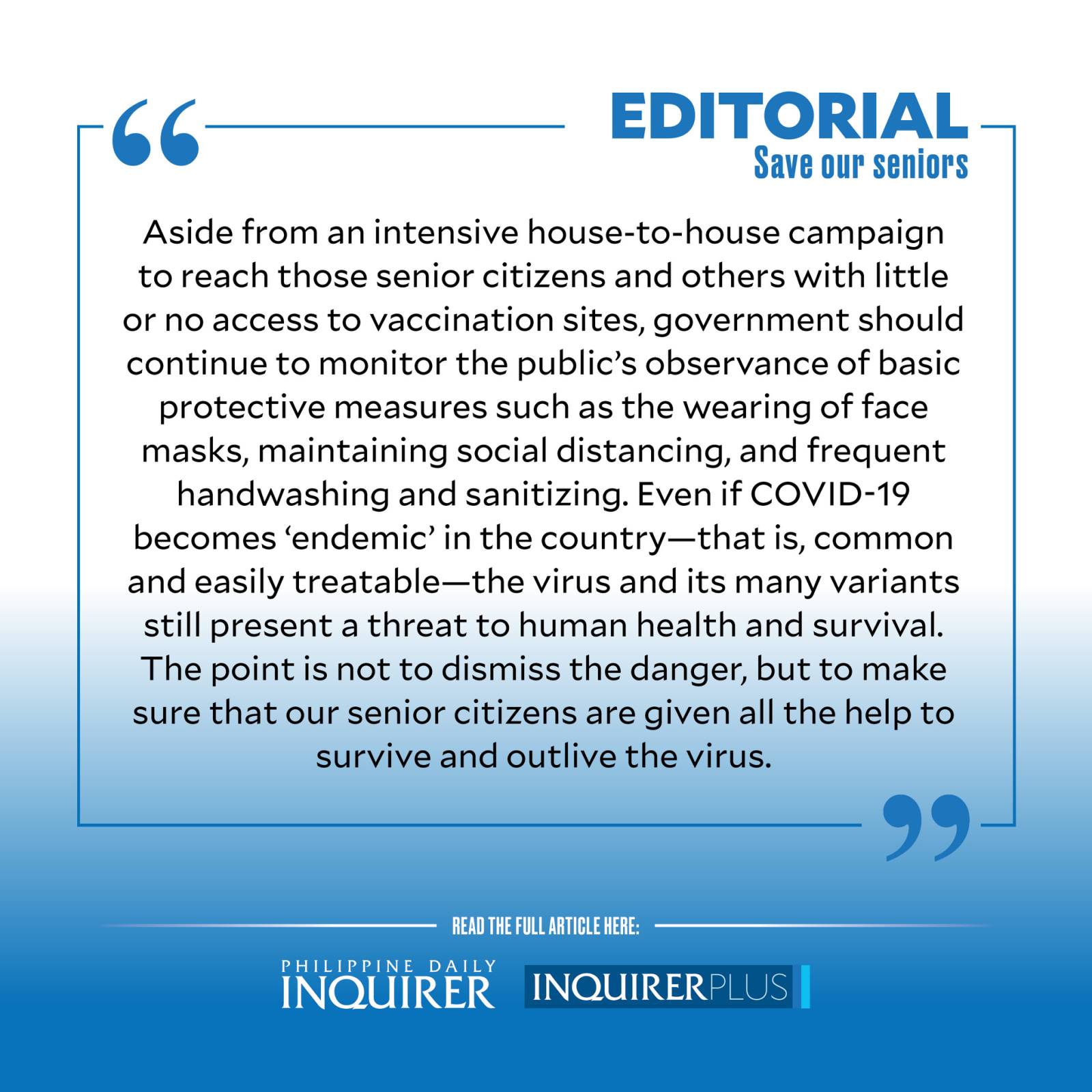Save our seniors
If, as a nation, our only concern regarding COVID-19 is efficiency, then remarks made by some senior citizens might make sense.
Health Undersecretary and National Vaccination Operations Center chief Dr. Myrna Cabotaje doubts that so-called “vaccine hesitancy,” arising from concerns about the vaccines’ efficacy, efficiency or safety, is the reason so many seniors remain unvaccinated. “Many (seniors) do not want (to get jabbed),” she acknowledged during a public briefing on the COVID-19 situation. “They’re saying that they’ll be dying soon anyway.”
Article continues after this advertisementIndeed, going by numbers, it might make sense to prioritize younger, more (or potentially more) productive people to receive protection against the virus. As it stands, more than two million (out of a universe of five million) senior citizens remain unvaccinated, despite a policy to put them on top of the list of those qualified for the shots.
But quite apart from the human rights aspect—every citizen has the right to optimum health regardless of age or circumstance—there is the reality that seniors are most vulnerable to COVID-19 because of poor immunity and numerous health-related issues, and are therefore the most susceptible to infection.
Cabotaje, however, points to another reason the government needs to ramp up the vaccination of seniors: “They don’t understand that if they get sick, their families will be affected.” Infecting one’s entire household is more likely now that the more transmissible Omicron variant has replaced the Delta variant as the dominant variant of the virus in the country as of Jan. 19, according to the Department of Health (DOH). Not to mention that when a senior is infected, he or she is especially in danger of developing serious complications which could result in hospitalization or death.
Article continues after this advertisementKnowing full well that seniors are deterred by even the smallest impediments or inconvenience, such as having to leave their homes to venture out to vaccination centers where they must stand and wait in long queues, the government is advocating home visits to seniors who are not mobile or have no companions to accompany them for their shots.
The push to reach the especially vulnerable like seniors, or those in areas with very low vaccine coverage such as the Bangsamoro Autonomous Region in Muslim Mindanao, comes even as the rest of the country chafes under the remaining restrictions in place to protect the populace from COVID-19.
Just recently, mayors in all the cities and municipalities of Metro Manila voted to place their jurisdictions under alert level 1 by March. This is the lowest possible alert level, which means people would be free to leave their homes and go about their business, including students trooping back to face-to-face classes; establishments including malls, cinemas, and churches could welcome customers and worshippers without restrictions, while public transport could revert to full capacity once more.
But the DOH, through Undersecretary Maria Rosario Vergeire, said in order to avoid another surge in COVID-19 cases, the environment has to be ready for the easing of restrictions to make it safe for people to go out. This includes compliance with the safety seal certification program that attests to an establishment’s adherence to minimum public health standards set by the DOH.
Pandemic task force officials have also added two new conditions before local government units (LGUs) can revert to alert level 1: LGUs must first ensure that at least 80 percent of senior citizens and 70 percent of the eligible population in their communities have been fully vaccinated against the virus, Duque said. Focal persons per region have been deployed to check on the LGUs’ compliance with this goal, according to the DOH. So far, more than 62.5 million or 56.7 percent of the country’s population have been fully vaccinated.
Other health authorities are looking for ways to entice the particularly vulnerable to get their shots. Noting how some establishments had used balloons, commercial mascots, cartoon characters, and giveaways to reassure children leery of getting vaccinated, Cabotaje wonders if creating such a “festive mood” in communities on vaccination days could serve as enough of a draw for those still unvaccinated.
Aside from an intensive house-to-house campaign to reach those senior citizens and others with little or no access to vaccination sites, government should continue to monitor the public’s observance of basic protective measures such as the wearing of face masks, maintaining social distancing, and frequent handwashing and sanitizing.
Even if COVID-19 becomes “endemic” in the country—that is, common and easily treatable—the virus and its many variants still present a threat to human health and survival. The point is not to dismiss the danger, but to make sure that our senior citizens are given all the help to survive and outlive the virus.
gsg
For more news about the novel coronavirus click here.
What you need to know about Coronavirus.
For more information on COVID-19, call the DOH Hotline: (02) 86517800 local 1149/1150.
The Inquirer Foundation supports our healthcare frontliners and is still accepting cash donations to be deposited at Banco de Oro (BDO) current account #007960018860 or donate through PayMaya using this link.

















